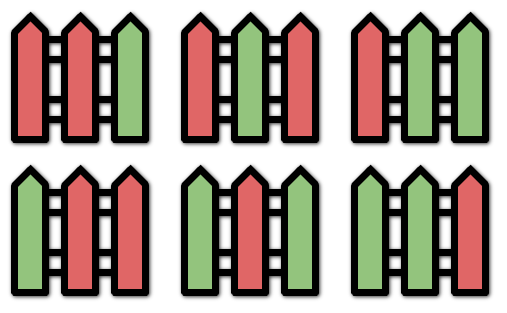You are painting a fence of n posts with k different colors. You must paint the posts following these rules:
- Every post must be painted exactly one color.
- There cannot be three or more consecutive posts with the same color.
Given the two integers n and k, return the number of ways you can paint the fence.
Example 1:
Input: n = 3, k = 2 Output: 6 Explanation: All the possibilities are shown. Note that painting all the posts red or all the posts green is invalid because there cannot be three posts in a row with the same color.
Example 2:
Input: n = 1, k = 1 Output: 1
Example 3:
Input: n = 7, k = 2 Output: 42
Constraints:
1 <= n <= 501 <= k <= 105- The testcases are generated such that the answer is in the range
[0, 231 - 1]for the givennandk.
We define
When
The final answer is
The time complexity is
class Solution:
def numWays(self, n: int, k: int) -> int:
f = [0] * n
g = [0] * n
f[0] = k
for i in range(1, n):
f[i] = (f[i - 1] + g[i - 1]) * (k - 1)
g[i] = f[i - 1]
return f[-1] + g[-1]class Solution {
public int numWays(int n, int k) {
int[] f = new int[n];
int[] g = new int[n];
f[0] = k;
for (int i = 1; i < n; ++i) {
f[i] = (f[i - 1] + g[i - 1]) * (k - 1);
g[i] = f[i - 1];
}
return f[n - 1] + g[n - 1];
}
}class Solution {
public:
int numWays(int n, int k) {
vector<int> f(n);
vector<int> g(n);
f[0] = k;
for (int i = 1; i < n; ++i) {
f[i] = (f[i - 1] + g[i - 1]) * (k - 1);
g[i] = f[i - 1];
}
return f[n - 1] + g[n - 1];
}
};func numWays(n int, k int) int {
f := make([]int, n)
g := make([]int, n)
f[0] = k
for i := 1; i < n; i++ {
f[i] = (f[i-1] + g[i-1]) * (k - 1)
g[i] = f[i-1]
}
return f[n-1] + g[n-1]
}function numWays(n: number, k: number): number {
const f: number[] = Array(n).fill(0);
const g: number[] = Array(n).fill(0);
f[0] = k;
for (let i = 1; i < n; ++i) {
f[i] = (f[i - 1] + g[i - 1]) * (k - 1);
g[i] = f[i - 1];
}
return f[n - 1] + g[n - 1];
}We notice that
class Solution:
def numWays(self, n: int, k: int) -> int:
f, g = k, 0
for _ in range(n - 1):
ff = (f + g) * (k - 1)
g = f
f = ff
return f + gclass Solution {
public int numWays(int n, int k) {
int f = k, g = 0;
for (int i = 1; i < n; ++i) {
int ff = (f + g) * (k - 1);
g = f;
f = ff;
}
return f + g;
}
}class Solution {
public:
int numWays(int n, int k) {
int f = k, g = 0;
for (int i = 1; i < n; ++i) {
int ff = (f + g) * (k - 1);
g = f;
f = ff;
}
return f + g;
}
};func numWays(n int, k int) int {
f, g := k, 0
for i := 1; i < n; i++ {
f, g = (f+g)*(k-1), f
}
return f + g
}function numWays(n: number, k: number): number {
let [f, g] = [k, 0];
for (let i = 1; i < n; ++i) {
const ff = (f + g) * (k - 1);
g = f;
f = ff;
}
return f + g;
}